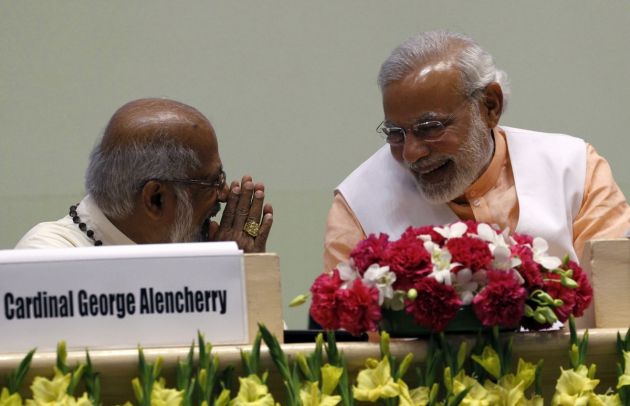Christian-majority Indian state is wary of new hard-line Hindu governor

Just days after the Kerala state's president of the Bharatiya Janata Party, Kummanam Rajasekharan, was sworn in as the Governor of Mizoram, he was accused of being anti-Christian, and calls for his removal have been initiated.
Opposition to the 65-year-old leader paints him as a radical Hindu leader, who is against Christians, The News Minute reported.
The People's Representation for Identity and Status of Mizoram (PRISM), an anti-corruption organization that became a political party in 2017, has reportedly launched a campaign to oust Rajasekharan from the state which is set to have elections later this year.
India's pro-Hindu BJP-led government appointed Rajasekharan, an to serve as the 18th governor of Christian-majority Mizoram state in northeast India.
PRISM's objections were chiefly based on Rajasekharan's recent role in Kerala.
The group said it was unprecedented to have an active politician as a governor in Mizoram, a tiny state sandwiched between Bangladesh and Myanmar.
Christians represent around 87 percent of the state's 1.1 million people. Another 8 percent are Buddhists, leaving Hindus with just 2.7 percent.
These demographics contrast with the national average which sees India composed of 80 percent Hindus and 2.3 percent Christians among its 1.28 billlion people.
In Meghalaya and Nagaland states, Christians also make up close to 90 percent of their respective populations.
The federal government nominated Rajasekharan while he was serving as president of the party's Kerala state unit.
MIXED CHRISTIAN REACTIONS
This drew mixed reactions from Christian leaders on the fairness of slotting an ideologically biased politician into what is supposed to be an apolitical role, UCANews reported.
He was sworn in on May 29 to effectively run the hilly state in India's northeast, one of three Christian-majority states along with Meghalaya and Nagaland.
He succeeded (retired) Lt. Gen. Nirbhay Sharma whose three-year tenure had ended.
He is also a known activist who belongs to the Rashtriya Swayamsevak Sangh (RSS), a hard-line Hindu nationalist paramilitary organization made up of volunteers.
Bishop Stephen Rotluanga of Aizawl, the state capital of Mizoram, told ucanews.com that he attended the oath-taking ceremony along with other Christian leaders.
Yet he said he did not "see the appointment as pushing any Hindu agenda."
State governors are viewed as representatives of India's president, a role currently filled by ex-Bihar governor Ram Nath Kovind.
They are empowered to ensure their respective state is run to protect the core values of the charter, notably by guaranteeing human rights and religious freedom, and working beyond the interests of any particular party.
But Rajasekharan's appointment came amid criticism that the BJP has been influencing state governors to make "favorable" decisions that ultimately serve its agenda.
Mizoram is expected to see assembly elections by December as the current government's term will draw to a close.
"We can't predict if his appointment will have any say in the outcome of the state election. People here have lived in harmony for years regardless of caste or creed," Bishop Rotluanga said.
"Everyone must abide by the constitution of India, including the president of this country and all the state governors, so we hope Gov. Rajasekharan will respect that, too," the prelate said.
Some Christian organizations criticized the decision to elevate Rajasekharan to his new role as they fear it could compromise their struggle for equal rights for Christians in the region.
PRISM PARTY
PRISM, which is a Christian-backed political party, and the Global Council of Indian Christians (GCIC) both issued statements describing him as a "radical Hindu."
GCIC President Sajan K. George told ucanews.com that the appointment "surprised and shocked" him.
He pointed to Rajasekharan's record of leading Hindu groups when conflict broke out between them and Christians in the southern state of Kerala in 1983.
Rajasekharan served as the BJP's unit chief of Kerala for three years.
In his statement, George appealed to President Ram Nath Kovind to replace Rajasekharan with a more "sober and fair-minded person."
The New Indian Express reported portions from a statement released by PRISM that listed how Kummanam has headed various Hindu organisations in Kerala:
"We all know that Mr. Kummanam Rajasekharan was newly sworn in as the Governor of our state. He is well-known for his anti-secularism that goes against the Indian Constitution.
"He has been a hardcore member of RSS, Vishva Hindu Parishad (VHP) and Hindu Aikya Vedi; well known as being against Christian missionaries and Christians in general.
"He was the general convener of Nilakkal Action Council and was directly instrumental in the Nilakkal Hindu-Christian conflict of 1983."